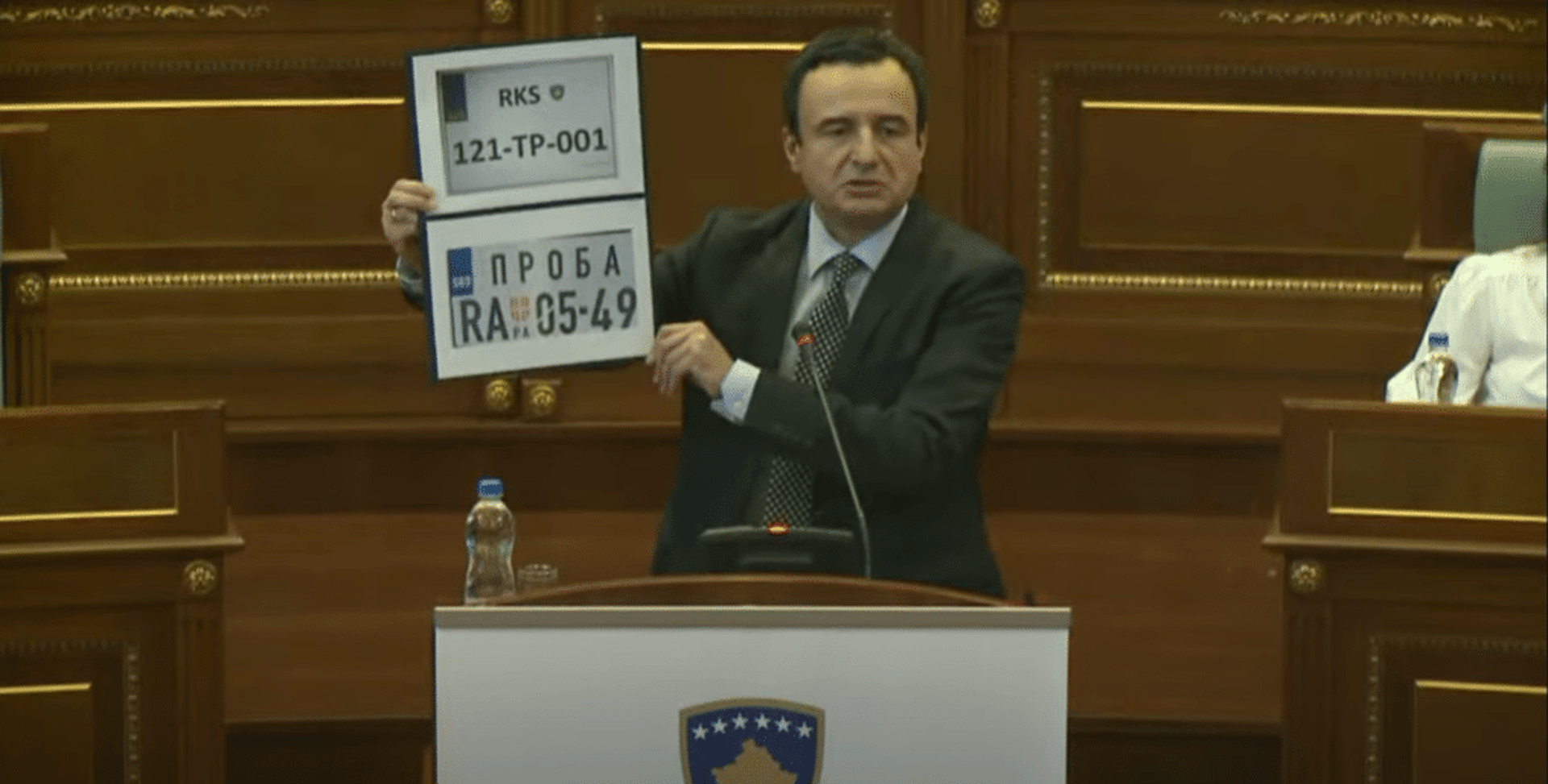
Unveiling the drive behind Albin Kurti's car plate mission
In this article, Tina delves into Albin Kurti’s move to address the Serb minority in Kosovo regarding the changing of their car registration plates. She analyses the underlying motives behind Kurti’s decision.
ANALYSIS
Doruntina Aruqaj
9/12/2022
Albin Kurti's recent move in addressing the Serb minority in Kosovo about switching their car registration plates to Kosovo car plates is a bold one, a decision likely to stir up much controversy and heated debate. Many will undoubtedly question the potential consequences that Kurti’s call will have, especially considering the Serb minority’s well-known hostility and opposition to being governed by a central Kosovo government. Fuelling the flames of enmity is the Serb government who encourage Kosovo-Serbs to boycott Kosovo institutions. Kurti knows he has a tough, or even ambitious challenge ahead of him in getting the Serb minority to cooperate and switch car plates. So, what sparks Kurti’s bold move? Why is this issue of car plates so important to him? In this think piece, I argue that Kurti’s call for the changing of car plates is strategic and a means of attempting to achieve his long-standing aim of protecting Kosovo’s sovereignty.
In getting Kosovo-Serbs to change their car plates to Kosovo car plates, Kurti attempts to protect Kosovo’s sovereignty by reclaiming Kosovo’s ruling authority in northern Kosovo. Kurti has long advocated for the territorial integrity of Kosovo throughout his political career, believing that as an independent state, Kosovo has every right to govern and exercise its sovereignty in all its regions and over all its citizens. However, according to Kurti, Kosovo’s ability to exercise this sovereignty has been hindered in various ways, most notably with the creation of Serb municipalities in northern Kosovo.
Much to Kurti’s frustration, the municipalities grant the Serb minority autonomy in infrastructure, economic development, health, education, and planning. Demonstrating his extreme lengths to oppose this formation, then member of opposition Kurti threw teargas inside Kosovo’s parliament in 2015. Using Bosnia’s two separate entities as an example to go against when it comes to protecting sovereignty, Kurti argued that the municipalities ultimately meant a risk of seeing a separate entity emerge in Kosovo, due to decision making powers being decentralised to Serb minority communities rather than a central Kosovo government. Thus evidently, Kurti’s stands firm in his belief that Kosovo has every right to exercise its sovereignty and has demonstrated his commitment to defending such beliefs in the past while a member of opposition.
However today, he is defending the same beliefs as the Prime Minister of Kosovo through diplomatic means rather than his previous extreme methods. In this case, the decision to get the Serb minority to change their car plates is a necessary step to take in order for Kosovo to reclaim their jurisdiction and authority in northern Kosovo. Ultimately, it is Kurti’s way of taking back some control over the north which was previously taken through the formation of the municipalities.
Another way Kurti wants to protect Kosovo’s sovereignty with his decision is by attempting to bring Kosovo-Serbs and Kosovo-Albanians under one national identity. In getting the Serb minority to adopt the same car plates as Kosovo-Albanians, Kurti is attempting to integrate the Serb minority with the wider Kosovo-Albanian community, something important in order to avoid potential conflict between these groups.
Harmony between the two ethnic groups in northern Kosovo is incredibly important to Kosovo’s sovereignty as it ensures some sense of stability. As well as being crucial to Kosovo’s stability internally, it is also important in helping Kosovo establish its reputation as a serious and legitimate state on the international stage. Kurti demonstrates his desire for harmony when stating that in adopting the Kosovo car plate registration, Kosovo-Serbs would be able to travel freely throughout Kosovo ‘without prejudice’. Prejudice free travel with Kosovo car plates acts as an alternative to Serbian car plates, which risk exposing Kosovo-Serbs to hostility.
For Kurti, the continued use of Serbian car plates is, in his own words, ‘Milosevic’s legacy’. This is interesting as it shows Kurti’s mindfulness of the dangers of isolating an ethnic group in Kosovo. History has demonstrated to us before that conflict is able to arise as a result of groups feeling marginalised. Not too long ago the Milosevic regime’s segregation and alienation of Albanians in Kosovo led to a bloody war. Thus, Kurti knows very well the dangers that may arise if the Serb minority feel isolated and he certainly does not want the Serb government exploiting this isolation. In changing their car plates to the Kosovo registration, the possibility of feeling as an outsider becomes less difficult since the Serb minority share a registration just like the rest of the Kosovo-Albanian citizens.
In the case of sovereignty, getting the minority to feel like rightful citizens is important, as a citizen is more likely to obey to the country’s authority rather than seeing it as a threat to their group. Such integration, in turn, enables Kosovo to exercise its sovereignty even in northern Kosovo.
So, the drive behind Kurti’s decision is evident. The question now is, will he be successful? Will the Serb minority cooperate, or will it spark further hostility between Kosovo and the Serb minority?
© 2025. All rights reserved.